Economic, Environmental, and Socio-Cultural Impacts of Tourism
VerifiedAdded on 2023/06/13
|6
|2271
|332
Essay
AI Summary
This essay provides a comprehensive analysis of the tourism industry, focusing on its economic, environmental, and socio-cultural impacts. It begins by defining tourism and its role in promoting travel and leisure, highlighting the industry's growth due to technological advancements and its significant contribution to global GDP. The essay explores positive economic impacts such as increased demand for local products and job creation, while also addressing negative impacts like reliance on imported goods and seasonal employment. Furthermore, it examines the environmental effects, noting positive aspects like water quality improvement and environmental awareness, alongside negative aspects such as increased pollution and disruption to wildlife. The analysis extends to socio-cultural impacts, discussing the benefits of cultural exchange and heritage preservation, as well as negative effects like the erosion of family bonding and the promotion of harmful social behaviors. The essay concludes with recommendations for promoting sustainable tourism, emphasizing the need to consider economic, environmental, and socio-cultural factors in future development strategies. This detailed exploration aims to provide a balanced understanding of tourism's multifaceted impacts and offer insights for creating a more sustainable and beneficial industry.
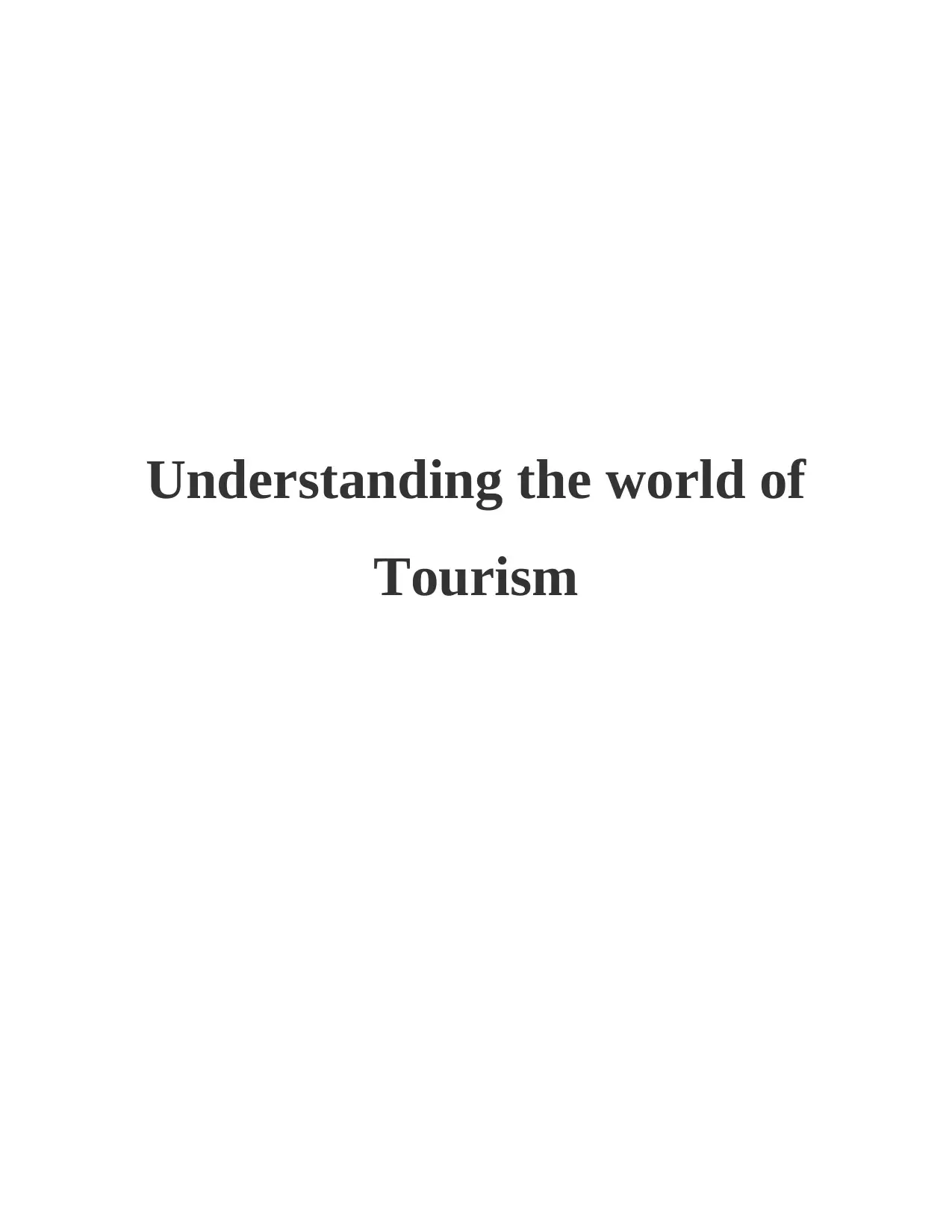
Understanding the world of
Tourism
Tourism
Paraphrase This Document
Need a fresh take? Get an instant paraphrase of this document with our AI Paraphraser
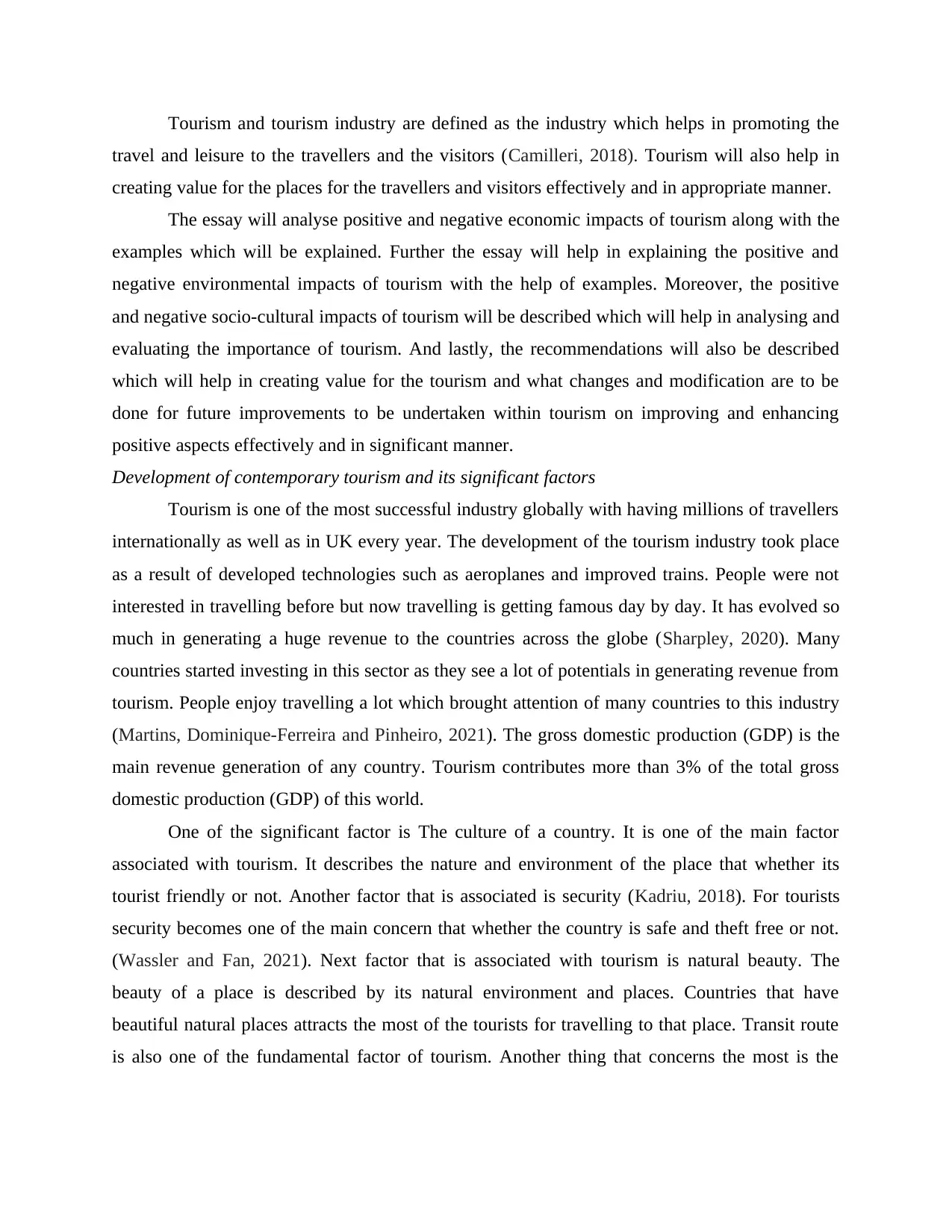
Tourism and tourism industry are defined as the industry which helps in promoting the
travel and leisure to the travellers and the visitors (Camilleri, 2018). Tourism will also help in
creating value for the places for the travellers and visitors effectively and in appropriate manner.
The essay will analyse positive and negative economic impacts of tourism along with the
examples which will be explained. Further the essay will help in explaining the positive and
negative environmental impacts of tourism with the help of examples. Moreover, the positive
and negative socio-cultural impacts of tourism will be described which will help in analysing and
evaluating the importance of tourism. And lastly, the recommendations will also be described
which will help in creating value for the tourism and what changes and modification are to be
done for future improvements to be undertaken within tourism on improving and enhancing
positive aspects effectively and in significant manner.
Development of contemporary tourism and its significant factors
Tourism is one of the most successful industry globally with having millions of travellers
internationally as well as in UK every year. The development of the tourism industry took place
as a result of developed technologies such as aeroplanes and improved trains. People were not
interested in travelling before but now travelling is getting famous day by day. It has evolved so
much in generating a huge revenue to the countries across the globe (Sharpley, 2020). Many
countries started investing in this sector as they see a lot of potentials in generating revenue from
tourism. People enjoy travelling a lot which brought attention of many countries to this industry
(Martins, Dominique-Ferreira and Pinheiro, 2021). The gross domestic production (GDP) is the
main revenue generation of any country. Tourism contributes more than 3% of the total gross
domestic production (GDP) of this world.
One of the significant factor is The culture of a country. It is one of the main factor
associated with tourism. It describes the nature and environment of the place that whether its
tourist friendly or not. Another factor that is associated is security (Kadriu, 2018). For tourists
security becomes one of the main concern that whether the country is safe and theft free or not.
(Wassler and Fan, 2021). Next factor that is associated with tourism is natural beauty. The
beauty of a place is described by its natural environment and places. Countries that have
beautiful natural places attracts the most of the tourists for travelling to that place. Transit route
is also one of the fundamental factor of tourism. Another thing that concerns the most is the
travel and leisure to the travellers and the visitors (Camilleri, 2018). Tourism will also help in
creating value for the places for the travellers and visitors effectively and in appropriate manner.
The essay will analyse positive and negative economic impacts of tourism along with the
examples which will be explained. Further the essay will help in explaining the positive and
negative environmental impacts of tourism with the help of examples. Moreover, the positive
and negative socio-cultural impacts of tourism will be described which will help in analysing and
evaluating the importance of tourism. And lastly, the recommendations will also be described
which will help in creating value for the tourism and what changes and modification are to be
done for future improvements to be undertaken within tourism on improving and enhancing
positive aspects effectively and in significant manner.
Development of contemporary tourism and its significant factors
Tourism is one of the most successful industry globally with having millions of travellers
internationally as well as in UK every year. The development of the tourism industry took place
as a result of developed technologies such as aeroplanes and improved trains. People were not
interested in travelling before but now travelling is getting famous day by day. It has evolved so
much in generating a huge revenue to the countries across the globe (Sharpley, 2020). Many
countries started investing in this sector as they see a lot of potentials in generating revenue from
tourism. People enjoy travelling a lot which brought attention of many countries to this industry
(Martins, Dominique-Ferreira and Pinheiro, 2021). The gross domestic production (GDP) is the
main revenue generation of any country. Tourism contributes more than 3% of the total gross
domestic production (GDP) of this world.
One of the significant factor is The culture of a country. It is one of the main factor
associated with tourism. It describes the nature and environment of the place that whether its
tourist friendly or not. Another factor that is associated is security (Kadriu, 2018). For tourists
security becomes one of the main concern that whether the country is safe and theft free or not.
(Wassler and Fan, 2021). Next factor that is associated with tourism is natural beauty. The
beauty of a place is described by its natural environment and places. Countries that have
beautiful natural places attracts the most of the tourists for travelling to that place. Transit route
is also one of the fundamental factor of tourism. Another thing that concerns the most is the
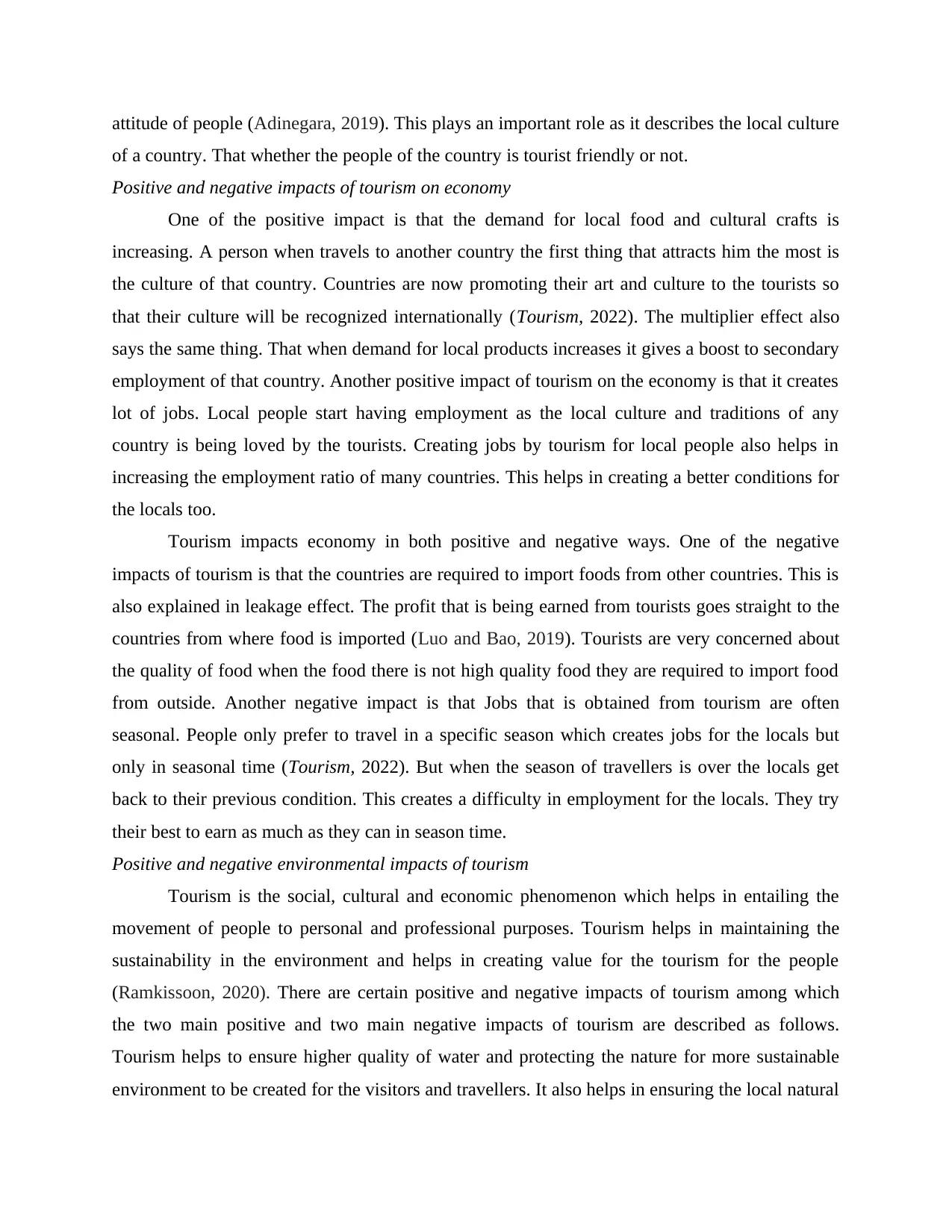
attitude of people (Adinegara, 2019). This plays an important role as it describes the local culture
of a country. That whether the people of the country is tourist friendly or not.
Positive and negative impacts of tourism on economy
One of the positive impact is that the demand for local food and cultural crafts is
increasing. A person when travels to another country the first thing that attracts him the most is
the culture of that country. Countries are now promoting their art and culture to the tourists so
that their culture will be recognized internationally (Tourism, 2022). The multiplier effect also
says the same thing. That when demand for local products increases it gives a boost to secondary
employment of that country. Another positive impact of tourism on the economy is that it creates
lot of jobs. Local people start having employment as the local culture and traditions of any
country is being loved by the tourists. Creating jobs by tourism for local people also helps in
increasing the employment ratio of many countries. This helps in creating a better conditions for
the locals too.
Tourism impacts economy in both positive and negative ways. One of the negative
impacts of tourism is that the countries are required to import foods from other countries. This is
also explained in leakage effect. The profit that is being earned from tourists goes straight to the
countries from where food is imported (Luo and Bao, 2019). Tourists are very concerned about
the quality of food when the food there is not high quality food they are required to import food
from outside. Another negative impact is that Jobs that is obtained from tourism are often
seasonal. People only prefer to travel in a specific season which creates jobs for the locals but
only in seasonal time (Tourism, 2022). But when the season of travellers is over the locals get
back to their previous condition. This creates a difficulty in employment for the locals. They try
their best to earn as much as they can in season time.
Positive and negative environmental impacts of tourism
Tourism is the social, cultural and economic phenomenon which helps in entailing the
movement of people to personal and professional purposes. Tourism helps in maintaining the
sustainability in the environment and helps in creating value for the tourism for the people
(Ramkissoon, 2020). There are certain positive and negative impacts of tourism among which
the two main positive and two main negative impacts of tourism are described as follows.
Tourism helps to ensure higher quality of water and protecting the nature for more sustainable
environment to be created for the visitors and travellers. It also helps in ensuring the local natural
of a country. That whether the people of the country is tourist friendly or not.
Positive and negative impacts of tourism on economy
One of the positive impact is that the demand for local food and cultural crafts is
increasing. A person when travels to another country the first thing that attracts him the most is
the culture of that country. Countries are now promoting their art and culture to the tourists so
that their culture will be recognized internationally (Tourism, 2022). The multiplier effect also
says the same thing. That when demand for local products increases it gives a boost to secondary
employment of that country. Another positive impact of tourism on the economy is that it creates
lot of jobs. Local people start having employment as the local culture and traditions of any
country is being loved by the tourists. Creating jobs by tourism for local people also helps in
increasing the employment ratio of many countries. This helps in creating a better conditions for
the locals too.
Tourism impacts economy in both positive and negative ways. One of the negative
impacts of tourism is that the countries are required to import foods from other countries. This is
also explained in leakage effect. The profit that is being earned from tourists goes straight to the
countries from where food is imported (Luo and Bao, 2019). Tourists are very concerned about
the quality of food when the food there is not high quality food they are required to import food
from outside. Another negative impact is that Jobs that is obtained from tourism are often
seasonal. People only prefer to travel in a specific season which creates jobs for the locals but
only in seasonal time (Tourism, 2022). But when the season of travellers is over the locals get
back to their previous condition. This creates a difficulty in employment for the locals. They try
their best to earn as much as they can in season time.
Positive and negative environmental impacts of tourism
Tourism is the social, cultural and economic phenomenon which helps in entailing the
movement of people to personal and professional purposes. Tourism helps in maintaining the
sustainability in the environment and helps in creating value for the tourism for the people
(Ramkissoon, 2020). There are certain positive and negative impacts of tourism among which
the two main positive and two main negative impacts of tourism are described as follows.
Tourism helps to ensure higher quality of water and protecting the nature for more sustainable
environment to be created for the visitors and travellers. It also helps in ensuring the local natural
⊘ This is a preview!⊘
Do you want full access?
Subscribe today to unlock all pages.

Trusted by 1+ million students worldwide
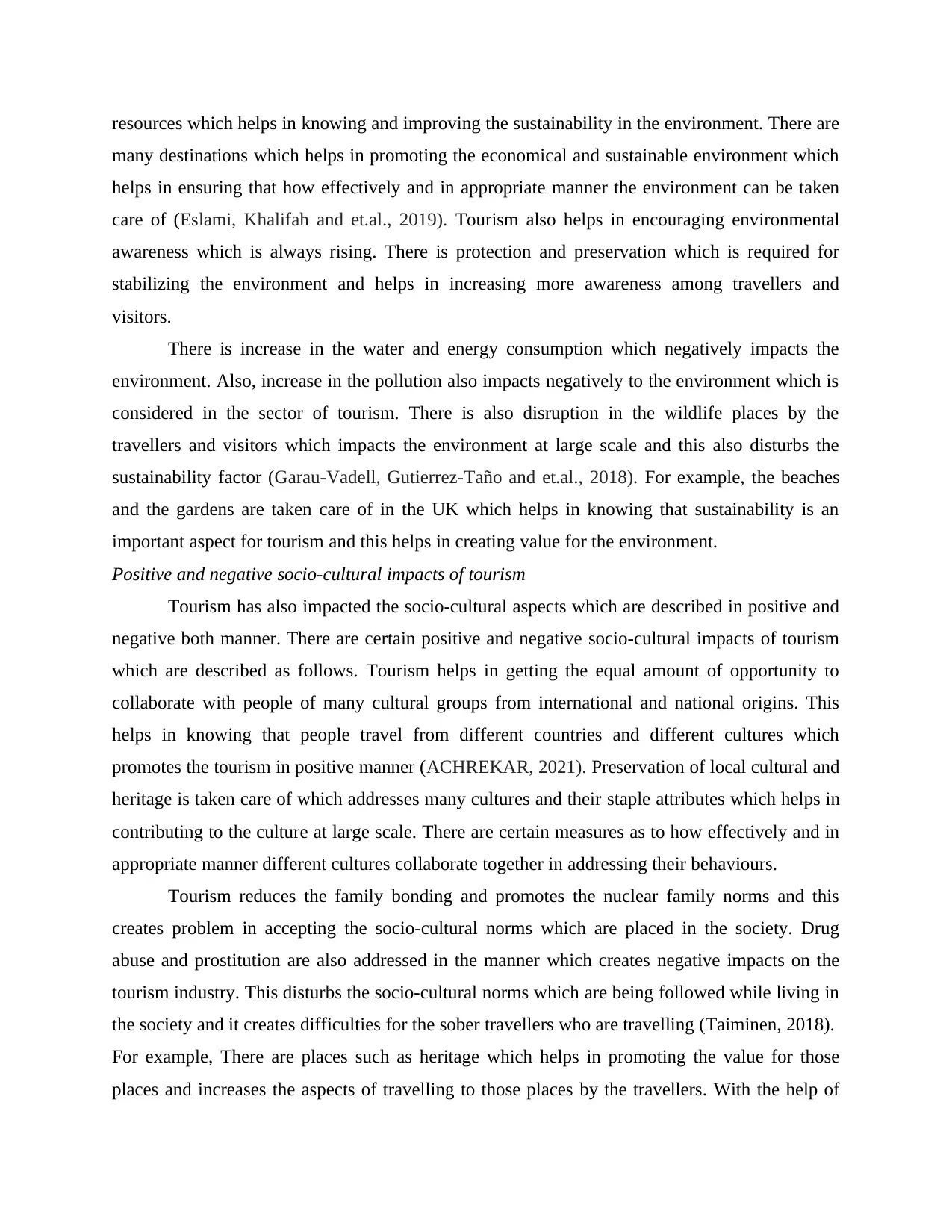
resources which helps in knowing and improving the sustainability in the environment. There are
many destinations which helps in promoting the economical and sustainable environment which
helps in ensuring that how effectively and in appropriate manner the environment can be taken
care of (Eslami, Khalifah and et.al., 2019). Tourism also helps in encouraging environmental
awareness which is always rising. There is protection and preservation which is required for
stabilizing the environment and helps in increasing more awareness among travellers and
visitors.
There is increase in the water and energy consumption which negatively impacts the
environment. Also, increase in the pollution also impacts negatively to the environment which is
considered in the sector of tourism. There is also disruption in the wildlife places by the
travellers and visitors which impacts the environment at large scale and this also disturbs the
sustainability factor (Garau-Vadell, Gutierrez-Taño and et.al., 2018). For example, the beaches
and the gardens are taken care of in the UK which helps in knowing that sustainability is an
important aspect for tourism and this helps in creating value for the environment.
Positive and negative socio-cultural impacts of tourism
Tourism has also impacted the socio-cultural aspects which are described in positive and
negative both manner. There are certain positive and negative socio-cultural impacts of tourism
which are described as follows. Tourism helps in getting the equal amount of opportunity to
collaborate with people of many cultural groups from international and national origins. This
helps in knowing that people travel from different countries and different cultures which
promotes the tourism in positive manner (ACHREKAR, 2021). Preservation of local cultural and
heritage is taken care of which addresses many cultures and their staple attributes which helps in
contributing to the culture at large scale. There are certain measures as to how effectively and in
appropriate manner different cultures collaborate together in addressing their behaviours.
Tourism reduces the family bonding and promotes the nuclear family norms and this
creates problem in accepting the socio-cultural norms which are placed in the society. Drug
abuse and prostitution are also addressed in the manner which creates negative impacts on the
tourism industry. This disturbs the socio-cultural norms which are being followed while living in
the society and it creates difficulties for the sober travellers who are travelling (Taiminen, 2018).
For example, There are places such as heritage which helps in promoting the value for those
places and increases the aspects of travelling to those places by the travellers. With the help of
many destinations which helps in promoting the economical and sustainable environment which
helps in ensuring that how effectively and in appropriate manner the environment can be taken
care of (Eslami, Khalifah and et.al., 2019). Tourism also helps in encouraging environmental
awareness which is always rising. There is protection and preservation which is required for
stabilizing the environment and helps in increasing more awareness among travellers and
visitors.
There is increase in the water and energy consumption which negatively impacts the
environment. Also, increase in the pollution also impacts negatively to the environment which is
considered in the sector of tourism. There is also disruption in the wildlife places by the
travellers and visitors which impacts the environment at large scale and this also disturbs the
sustainability factor (Garau-Vadell, Gutierrez-Taño and et.al., 2018). For example, the beaches
and the gardens are taken care of in the UK which helps in knowing that sustainability is an
important aspect for tourism and this helps in creating value for the environment.
Positive and negative socio-cultural impacts of tourism
Tourism has also impacted the socio-cultural aspects which are described in positive and
negative both manner. There are certain positive and negative socio-cultural impacts of tourism
which are described as follows. Tourism helps in getting the equal amount of opportunity to
collaborate with people of many cultural groups from international and national origins. This
helps in knowing that people travel from different countries and different cultures which
promotes the tourism in positive manner (ACHREKAR, 2021). Preservation of local cultural and
heritage is taken care of which addresses many cultures and their staple attributes which helps in
contributing to the culture at large scale. There are certain measures as to how effectively and in
appropriate manner different cultures collaborate together in addressing their behaviours.
Tourism reduces the family bonding and promotes the nuclear family norms and this
creates problem in accepting the socio-cultural norms which are placed in the society. Drug
abuse and prostitution are also addressed in the manner which creates negative impacts on the
tourism industry. This disturbs the socio-cultural norms which are being followed while living in
the society and it creates difficulties for the sober travellers who are travelling (Taiminen, 2018).
For example, There are places such as heritage which helps in promoting the value for those
places and increases the aspects of travelling to those places by the travellers. With the help of
Paraphrase This Document
Need a fresh take? Get an instant paraphrase of this document with our AI Paraphraser
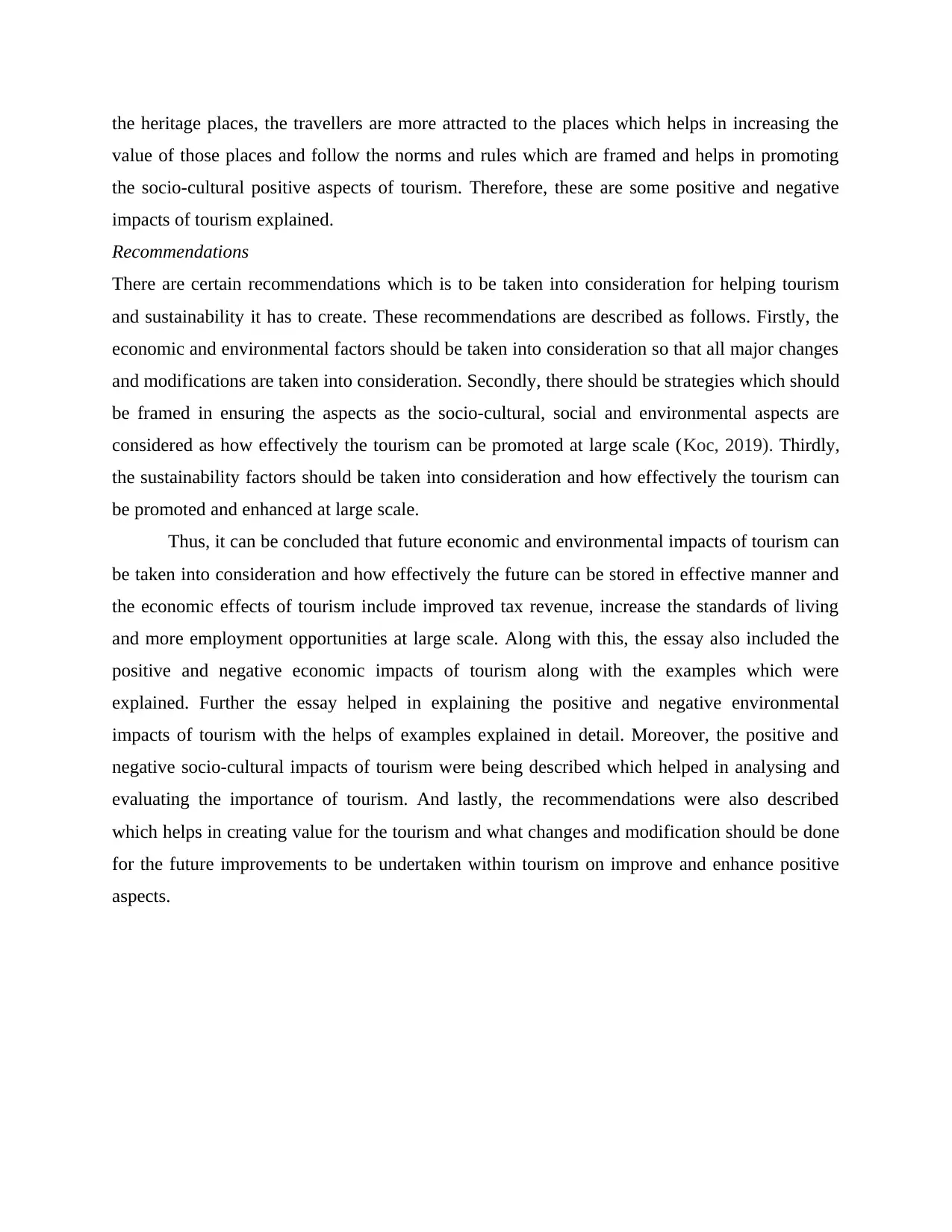
the heritage places, the travellers are more attracted to the places which helps in increasing the
value of those places and follow the norms and rules which are framed and helps in promoting
the socio-cultural positive aspects of tourism. Therefore, these are some positive and negative
impacts of tourism explained.
Recommendations
There are certain recommendations which is to be taken into consideration for helping tourism
and sustainability it has to create. These recommendations are described as follows. Firstly, the
economic and environmental factors should be taken into consideration so that all major changes
and modifications are taken into consideration. Secondly, there should be strategies which should
be framed in ensuring the aspects as the socio-cultural, social and environmental aspects are
considered as how effectively the tourism can be promoted at large scale (Koc, 2019). Thirdly,
the sustainability factors should be taken into consideration and how effectively the tourism can
be promoted and enhanced at large scale.
Thus, it can be concluded that future economic and environmental impacts of tourism can
be taken into consideration and how effectively the future can be stored in effective manner and
the economic effects of tourism include improved tax revenue, increase the standards of living
and more employment opportunities at large scale. Along with this, the essay also included the
positive and negative economic impacts of tourism along with the examples which were
explained. Further the essay helped in explaining the positive and negative environmental
impacts of tourism with the helps of examples explained in detail. Moreover, the positive and
negative socio-cultural impacts of tourism were being described which helped in analysing and
evaluating the importance of tourism. And lastly, the recommendations were also described
which helps in creating value for the tourism and what changes and modification should be done
for the future improvements to be undertaken within tourism on improve and enhance positive
aspects.
value of those places and follow the norms and rules which are framed and helps in promoting
the socio-cultural positive aspects of tourism. Therefore, these are some positive and negative
impacts of tourism explained.
Recommendations
There are certain recommendations which is to be taken into consideration for helping tourism
and sustainability it has to create. These recommendations are described as follows. Firstly, the
economic and environmental factors should be taken into consideration so that all major changes
and modifications are taken into consideration. Secondly, there should be strategies which should
be framed in ensuring the aspects as the socio-cultural, social and environmental aspects are
considered as how effectively the tourism can be promoted at large scale (Koc, 2019). Thirdly,
the sustainability factors should be taken into consideration and how effectively the tourism can
be promoted and enhanced at large scale.
Thus, it can be concluded that future economic and environmental impacts of tourism can
be taken into consideration and how effectively the future can be stored in effective manner and
the economic effects of tourism include improved tax revenue, increase the standards of living
and more employment opportunities at large scale. Along with this, the essay also included the
positive and negative economic impacts of tourism along with the examples which were
explained. Further the essay helped in explaining the positive and negative environmental
impacts of tourism with the helps of examples explained in detail. Moreover, the positive and
negative socio-cultural impacts of tourism were being described which helped in analysing and
evaluating the importance of tourism. And lastly, the recommendations were also described
which helps in creating value for the tourism and what changes and modification should be done
for the future improvements to be undertaken within tourism on improve and enhance positive
aspects.
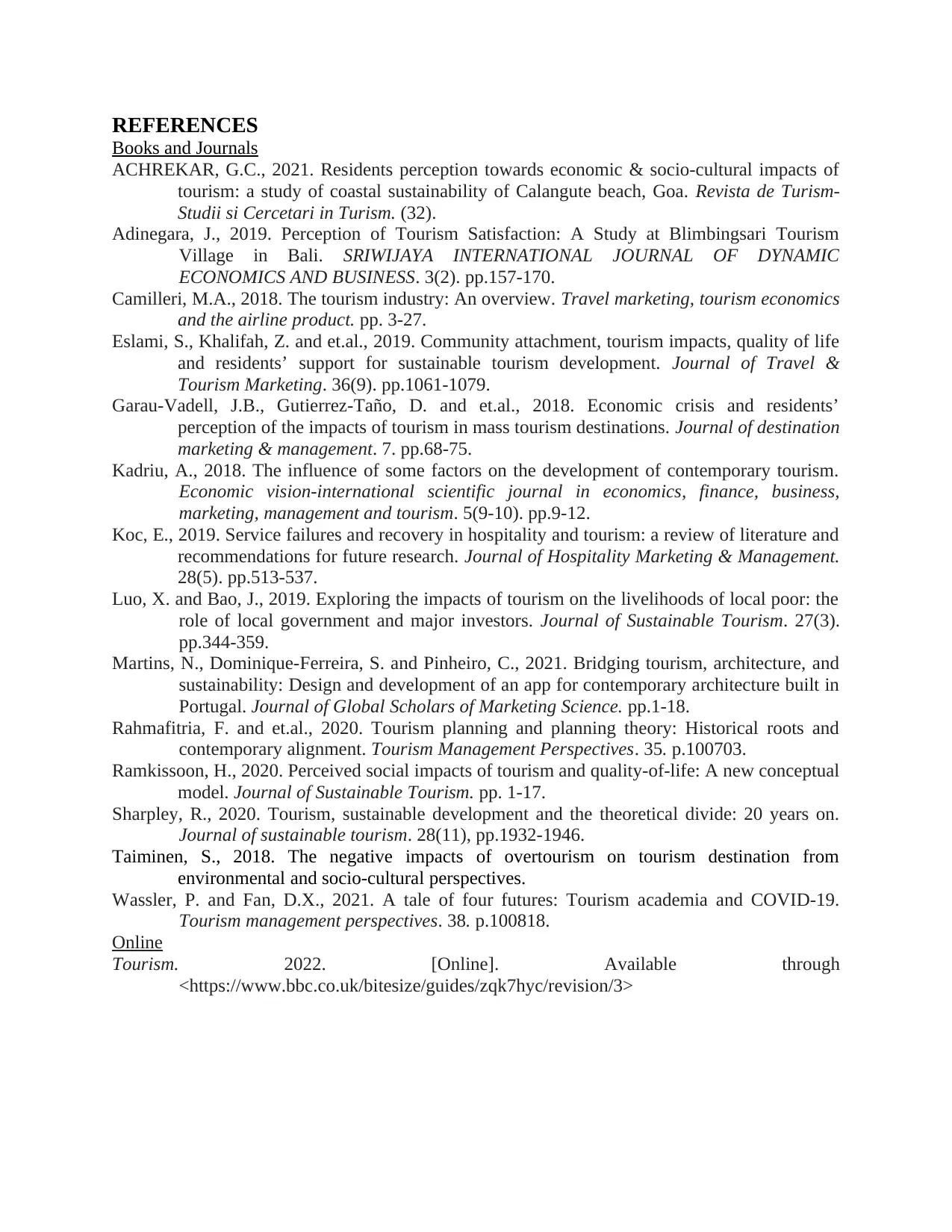
REFERENCES
Books and Journals
ACHREKAR, G.C., 2021. Residents perception towards economic & socio-cultural impacts of
tourism: a study of coastal sustainability of Calangute beach, Goa. Revista de Turism-
Studii si Cercetari in Turism. (32).
Adinegara, J., 2019. Perception of Tourism Satisfaction: A Study at Blimbingsari Tourism
Village in Bali. SRIWIJAYA INTERNATIONAL JOURNAL OF DYNAMIC
ECONOMICS AND BUSINESS. 3(2). pp.157-170.
Camilleri, M.A., 2018. The tourism industry: An overview. Travel marketing, tourism economics
and the airline product. pp. 3-27.
Eslami, S., Khalifah, Z. and et.al., 2019. Community attachment, tourism impacts, quality of life
and residents’ support for sustainable tourism development. Journal of Travel &
Tourism Marketing. 36(9). pp.1061-1079.
Garau-Vadell, J.B., Gutierrez-Taño, D. and et.al., 2018. Economic crisis and residents’
perception of the impacts of tourism in mass tourism destinations. Journal of destination
marketing & management. 7. pp.68-75.
Kadriu, A., 2018. The influence of some factors on the development of contemporary tourism.
Economic vision-international scientific journal in economics, finance, business,
marketing, management and tourism. 5(9-10). pp.9-12.
Koc, E., 2019. Service failures and recovery in hospitality and tourism: a review of literature and
recommendations for future research. Journal of Hospitality Marketing & Management.
28(5). pp.513-537.
Luo, X. and Bao, J., 2019. Exploring the impacts of tourism on the livelihoods of local poor: the
role of local government and major investors. Journal of Sustainable Tourism. 27(3).
pp.344-359.
Martins, N., Dominique-Ferreira, S. and Pinheiro, C., 2021. Bridging tourism, architecture, and
sustainability: Design and development of an app for contemporary architecture built in
Portugal. Journal of Global Scholars of Marketing Science. pp.1-18.
Rahmafitria, F. and et.al., 2020. Tourism planning and planning theory: Historical roots and
contemporary alignment. Tourism Management Perspectives. 35. p.100703.
Ramkissoon, H., 2020. Perceived social impacts of tourism and quality-of-life: A new conceptual
model. Journal of Sustainable Tourism. pp. 1-17.
Sharpley, R., 2020. Tourism, sustainable development and the theoretical divide: 20 years on.
Journal of sustainable tourism. 28(11), pp.1932-1946.
Taiminen, S., 2018. The negative impacts of overtourism on tourism destination from
environmental and socio-cultural perspectives.
Wassler, P. and Fan, D.X., 2021. A tale of four futures: Tourism academia and COVID-19.
Tourism management perspectives. 38. p.100818.
Online
Tourism. 2022. [Online]. Available through
<https://www.bbc.co.uk/bitesize/guides/zqk7hyc/revision/3>
Books and Journals
ACHREKAR, G.C., 2021. Residents perception towards economic & socio-cultural impacts of
tourism: a study of coastal sustainability of Calangute beach, Goa. Revista de Turism-
Studii si Cercetari in Turism. (32).
Adinegara, J., 2019. Perception of Tourism Satisfaction: A Study at Blimbingsari Tourism
Village in Bali. SRIWIJAYA INTERNATIONAL JOURNAL OF DYNAMIC
ECONOMICS AND BUSINESS. 3(2). pp.157-170.
Camilleri, M.A., 2018. The tourism industry: An overview. Travel marketing, tourism economics
and the airline product. pp. 3-27.
Eslami, S., Khalifah, Z. and et.al., 2019. Community attachment, tourism impacts, quality of life
and residents’ support for sustainable tourism development. Journal of Travel &
Tourism Marketing. 36(9). pp.1061-1079.
Garau-Vadell, J.B., Gutierrez-Taño, D. and et.al., 2018. Economic crisis and residents’
perception of the impacts of tourism in mass tourism destinations. Journal of destination
marketing & management. 7. pp.68-75.
Kadriu, A., 2018. The influence of some factors on the development of contemporary tourism.
Economic vision-international scientific journal in economics, finance, business,
marketing, management and tourism. 5(9-10). pp.9-12.
Koc, E., 2019. Service failures and recovery in hospitality and tourism: a review of literature and
recommendations for future research. Journal of Hospitality Marketing & Management.
28(5). pp.513-537.
Luo, X. and Bao, J., 2019. Exploring the impacts of tourism on the livelihoods of local poor: the
role of local government and major investors. Journal of Sustainable Tourism. 27(3).
pp.344-359.
Martins, N., Dominique-Ferreira, S. and Pinheiro, C., 2021. Bridging tourism, architecture, and
sustainability: Design and development of an app for contemporary architecture built in
Portugal. Journal of Global Scholars of Marketing Science. pp.1-18.
Rahmafitria, F. and et.al., 2020. Tourism planning and planning theory: Historical roots and
contemporary alignment. Tourism Management Perspectives. 35. p.100703.
Ramkissoon, H., 2020. Perceived social impacts of tourism and quality-of-life: A new conceptual
model. Journal of Sustainable Tourism. pp. 1-17.
Sharpley, R., 2020. Tourism, sustainable development and the theoretical divide: 20 years on.
Journal of sustainable tourism. 28(11), pp.1932-1946.
Taiminen, S., 2018. The negative impacts of overtourism on tourism destination from
environmental and socio-cultural perspectives.
Wassler, P. and Fan, D.X., 2021. A tale of four futures: Tourism academia and COVID-19.
Tourism management perspectives. 38. p.100818.
Online
Tourism. 2022. [Online]. Available through
<https://www.bbc.co.uk/bitesize/guides/zqk7hyc/revision/3>
⊘ This is a preview!⊘
Do you want full access?
Subscribe today to unlock all pages.

Trusted by 1+ million students worldwide
1 out of 6
Related Documents
Your All-in-One AI-Powered Toolkit for Academic Success.
+13062052269
info@desklib.com
Available 24*7 on WhatsApp / Email
![[object Object]](/_next/static/media/star-bottom.7253800d.svg)
Unlock your academic potential
Copyright © 2020–2025 A2Z Services. All Rights Reserved. Developed and managed by ZUCOL.


